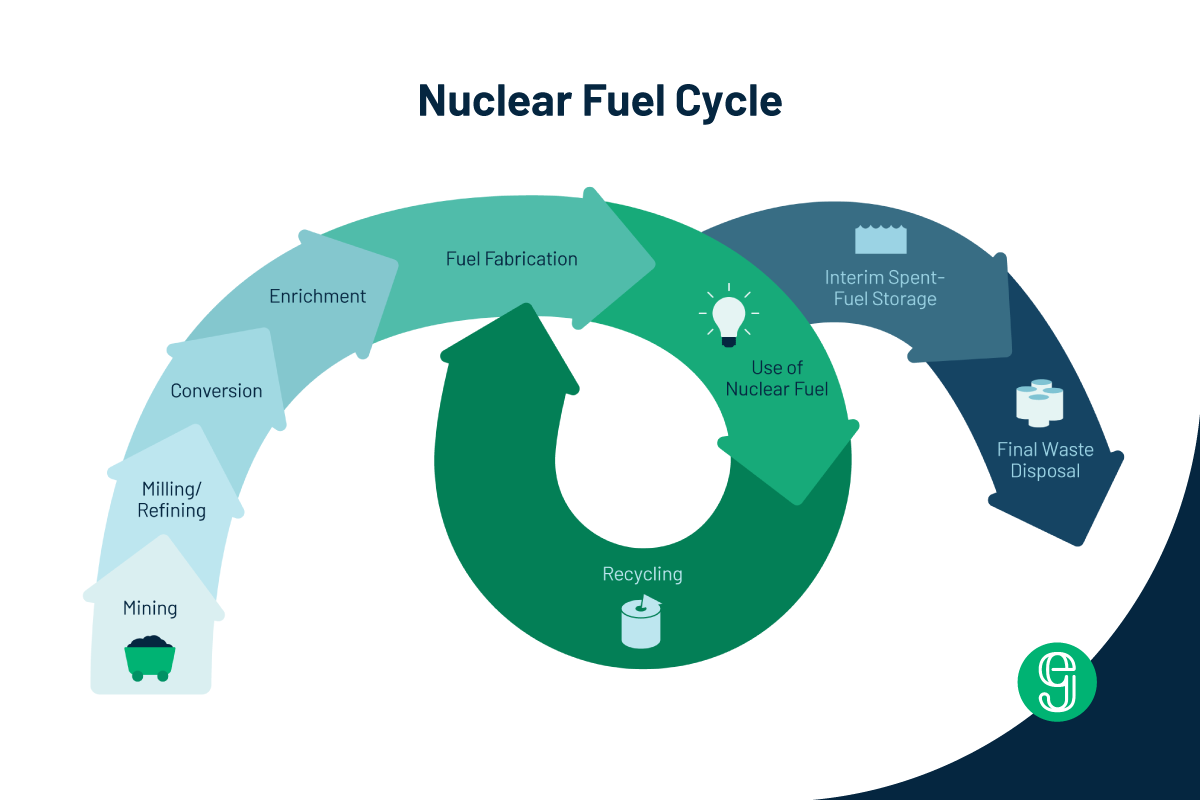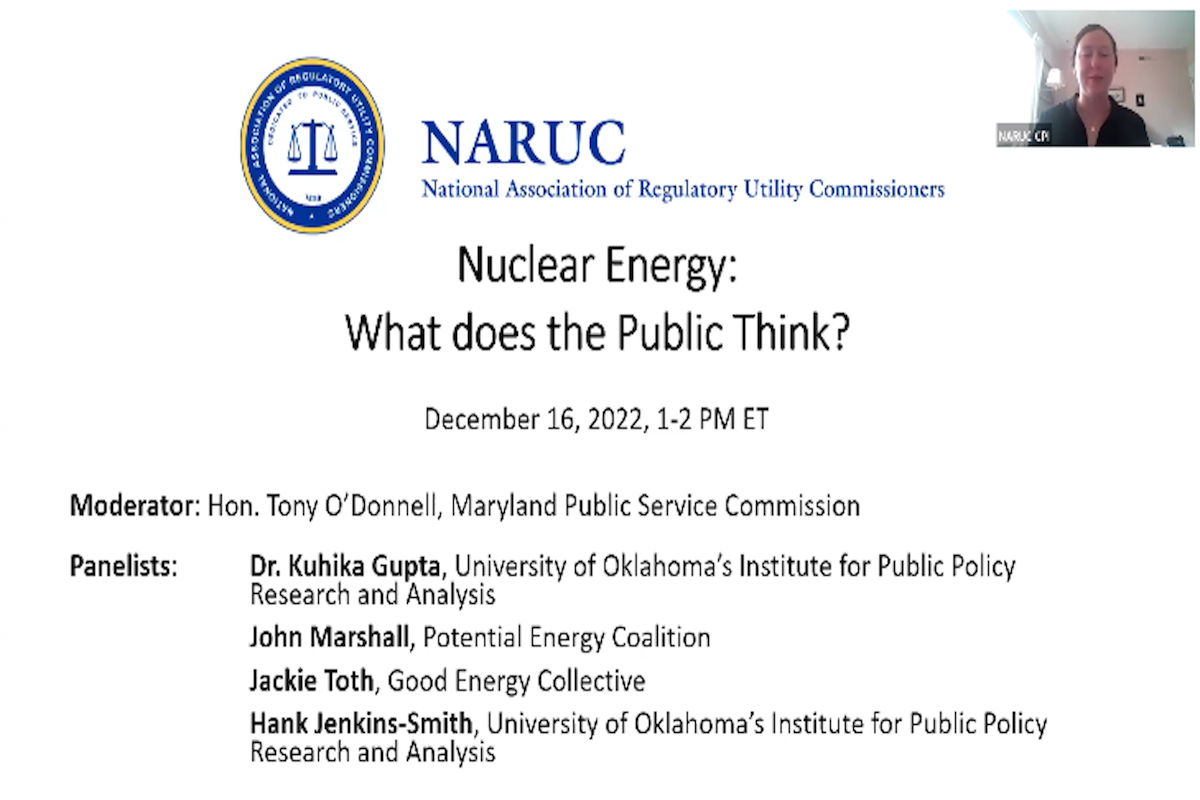Recommendations for advanced nuclear technologies as part of the U.S. climate change response

Image by L. Vernon. Sources: Earth, NASA; Icons, Noun Project.
Climate change is accelerating and the climate movement has gained considerable political momentum. Nuclear energy will be needed to reach ambitious climate goals, but we must first reconstruct the technology for a new era complete with modern, socially-grounded approaches. Smart policies and better nuclear governance can help quickly shift the sector to a new, more sustainable pathway. Better governance will require a step-change by the administration, congress, and the nuclear industry.
In 2021, the administration should come in with a clear mandate to leverage advanced nuclear technology in the climate fight as a part of the Green Recovery; they should install dedicated nuclear energy leadership at the White House and relevant government agencies such as the Department of Energy, the State Department, and the Department of Commerce; and they should have a plan for strong interagency cooperation, including across civilian and military agencies. Program planning should be realigned to support the rapid adoption of advanced reactors. Congress should redouble its efforts to modernize the regulatory process and increase spending to commercialize advanced nuclear technologies, and industry must be prepared to make fundamental changes in the way that they do business both domestically and internationally.
Here are the specific steps that different players must take to achieve an advanced nuclear-inclusive climate response:
1. The Incoming Administration
Supply
- Establish a climate office at the White House as recommended in the Evergreen Action Plan and the Unity Task Force plan and include a nuclear-specific staff position.
- Include advanced nuclear energy as a part of the climate response and set a clear mandate for an environmentally-just, community-centered approach to technology adoption.
- Quadruple spending on nuclear energy commercialization, including associated social science work that will be needed to achieve equitable access to these new technologies.
- Adopt a whole of government approach, increase intra-agency coordination, and activate federal infrastructure to expedite technology readiness, including an international export strategy as part of the global climate response with a priority for serving development needs.
Demand
- Include advanced nuclear energy in all climate policies and, where appropriate, in industrial planning and public works programs.
- Leverage the full power of the federal government in market development; generate demand pull via incentives, federal procurement, loans, and direct subsidies for adopting nuclear energy.
- Spur efforts that enable the complementary integration with renewable energy sources, including ideas such as generation of low-carbon fuels, provision of process heat, and varying electricity output.
- Require community consent as a part of federal support for nuclear projects, and do not push forward projects that have active community opposition.
Social License
- Establish a social science agenda for nuclear energy with the goal of achieving more equitable adoption of advanced reactors. This effort should serve to address historic inequalities in nuclear technology access, to expedite legacy clean-up efforts, to ensure community participation in the development of advanced nuclear projects, and to fulfill the federal government’s responsibility on nuclear waste.
- Prioritize the integration of safeguards- and security-by-design into new reactor designs.
- Prepare for the export of advanced reactors as a form of international development and/or foreign aid, while recognizing the diverse energy needs of emerging economies. Develop meaningful RD&D partnerships that advance the best in technology, economics, public policy, and social science with allied countries.
2. Congress
Supply
- Bring progressive leaders into the bipartisan coalition of policy makers working on advanced nuclear deployment in Congress.
- Support the administration's budget request to immediately double, then quadruple spending on nuclear deployment over the course of their first term, with a portion of the funding allocated for social science.
- Provide funding and a mandate for the Nuclear Regulatory Commission to continue to streamline and expedite licensing for advanced reactors.
Demand
- Integrate advanced nuclear energy into climate legislation as a part of the Green Recovery. Incentives should be similar to those for renewables: loan guarantees, production and investment tax credits, access to public lands, federal Power Purchase Agreements, etc.
- Provide new funding for user applications via novel demonstrations including transportation, industrial heat, and nuclear-powered carbon capture.
- Provide resources, support, and funding to communities that do, or want to explore the possibility to, demonstrate or adopt advanced nuclear projects.
Social License
- Update the Nuclear Waste Policy Act to reflect the need for multiple pathways for storage, spent fuel management, and disposition, and enable the use of the Nuclear Waste Fund for objectives other than Yucca Mountain. Invest in rigorous research and benchmarking in order to identify and use best practices regarding the screening and self-selection of host communities.
- Design new, replicable, equitable export processes for global nuclear technology adoption.
- Pass new legislation to fund community-led climate planning and feasibility studies to enable communities to self-assess and self-determine if advanced nuclear technologies are right for them.
- Commission a study through USDA’s Rural Development office to better understand the opportunities and challenges of small-scale nuclear energy for rural communities.
3. The Nuclear Industry
Supply
- Co-create new business and finance models for new nuclear technologies that are tailored to meeting the needs of communities.
- Ensure a robust commercialization pathway to bring advanced reactor designs to market, even after initial technologies have been adopted.
- Coordinate efforts within industry to build robust supply chains.
Demand
- Work with climate & renewables groups at the state- and regional-level to advance clean energy mandates.
- Participate in programs to demonstrate new technologies or business models that could increase demand, e.g. piloting syn fuel generation technology or flexible grid integration strategies.
- Fund studies and demonstrations of Nuclear-Renewable Hybrid Energy Systems.
- Structure projects to maximize local and long-term job creation, prioritizing historically underserved and fossil-energy communities.
Social License
- Focus on responding to climate change and moving people out of energy poverty.
- Adopt a sociotechnical approach to deployment that includes in-depth consideration of technology, geography, economics, politics, social issues, and historical context.
- Investigate and understand the factors that resulted in a homogeneous nuclear sector and disenfranchisement of communities.
- Implement concrete, resourced, actionable programs to build a nuclear sector that welcomes and supports individuals of all races, identities, and backgrounds.
- Develop a culture of security and safeguards by design that enables newcomer countries to more easily gain access to advanced nuclear technologies.















































.png)























.png)






%252520(1200%252520%2525C3%252597%252520800%252520px).png)








